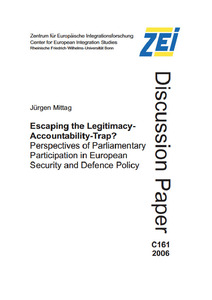Escaping the legitimacy accountability trap?perspectives of parliamentary participation in European security and defence policy

Escaping the legitimacy accountability trap?
perspectives of parliamentary participation in European security and defence policy

| dc.contributor.author | Mittag, Jürgen | |
| dc.date.accessioned | 2022-07-14T15:13:21Z | |
| dc.date.available | 2022-07-14T15:13:21Z | |
| dc.date.issued | 2006 | |
| dc.identifier.uri | https://hdl.handle.net/20.500.11811/10074 | |
| dc.description.abstract | Since the early 1980s foreign and security policy has attracted growing attention at the European level. To an increasing extent European summits and Intergovernmental Conferences have dealt with foreign affairs and provided the European Union with new powers. Throughout the last years the formation of the European Security and Defence Policy (ESDP) has belonged to the most prominent and dynamical developments of European integration. From an academic point of view the European Security and Defence Policy has been analysed as “the ultimate challenge”, while it is regarded among political actors “to be one of [the] main projects of the EU in coming years”.
Reasons bringing security and defence policy to the European level could be traced back to three major considerations. 1) Previous European defence institutions - namely WEU and ESDI within the NATO - have not been considered as effective. The embarrassment caused by the failing of European bodies and institutions in the crisis of former Yugoslavia in the 1990s, particularly in Kosovo, forced the EU member states to look for more coherent alternatives. 2) In view of its economic power the European Union has developed to a relevant player in the international system. The engagement in single market related fields such as trade or development policy is closely interwoven with foreign matters. Hence, the European Union can no longer reject the need to play a more capable and visible role in the international system including security and defence issues. 3) Confronted with reduced national (defence) budgets the European Union is increasingly considered by its member states as a framework for a stronger and more efficient involvement of nation states in international affairs. Based on these notions, the European Union in the past years has introduced European Security and Defence Policy in addition to the already existing elements of Common Foreign and Security Policy (CFSP). Starting with a brief overview on recent developments and missions in ESDP this paper first raises the question of public support in this policy field focussing on the discussion about legitimacy. Stressing the role of parliaments, the study then analyses the current institutional arrangements for ESDP at the EU level in terms of legitimacy or - more concretely - voice, scrutiny, transparency and accountability. Based on an analysis where parliaments at the EU level come in and where their room for manoeuvre is limited the paper concludes with ten options for prospective parliamentary participation in ESDP. | en |
| dc.format.extent | 33 | |
| dc.language.iso | eng | |
| dc.relation.ispartofseries | ZEI Discussion Paper ; C161 | |
| dc.rights | In Copyright | |
| dc.rights.uri | http://rightsstatements.org/vocab/InC/1.0/ | |
| dc.subject | Europäische Union | |
| dc.subject | Gemeinsame Sicherheits- und Verteidigungspolitik | |
| dc.subject | Europäische Sicherheits- und Verteidigungspolitik | |
| dc.subject | Sicherheitspolitik | |
| dc.subject.ddc | 320 Politik | |
| dc.title | Escaping the legitimacy accountability trap? | |
| dc.title.alternative | perspectives of parliamentary participation in European security and defence policy | |
| dc.type | Arbeitspapier | |
| dc.publisher.name | Zentrum für Europäische Integrationsforschung (ZEI) | |
| dc.publisher.location | Bonn | |
| dc.rights.accessRights | openAccess | |
| dc.relation.pissn | 1435-3288 | |
| dc.relation.pisbn | 3-936183-61-9 | |
| dc.relation.url | https://www.zei.uni-bonn.de/de/publikationen/medien/zei-dp/zei-dp-161-2006.pdf | |
| ulbbn.pubtype | Zweitveröffentlichung |
Files in this item
This item appears in the following Collection(s)
-
ZEI Discussion Paper (286)




